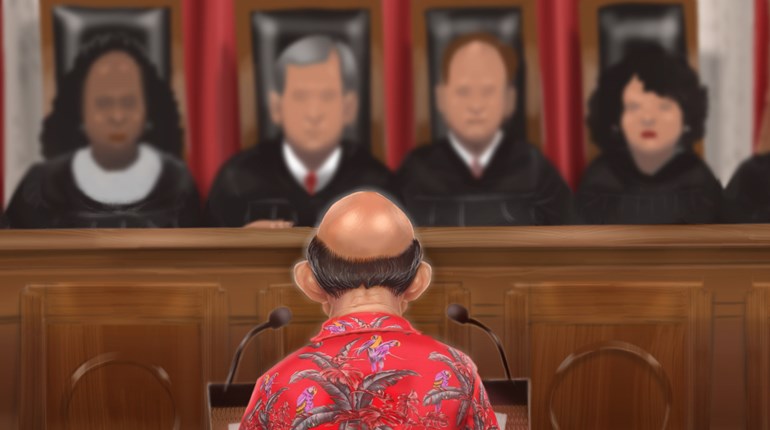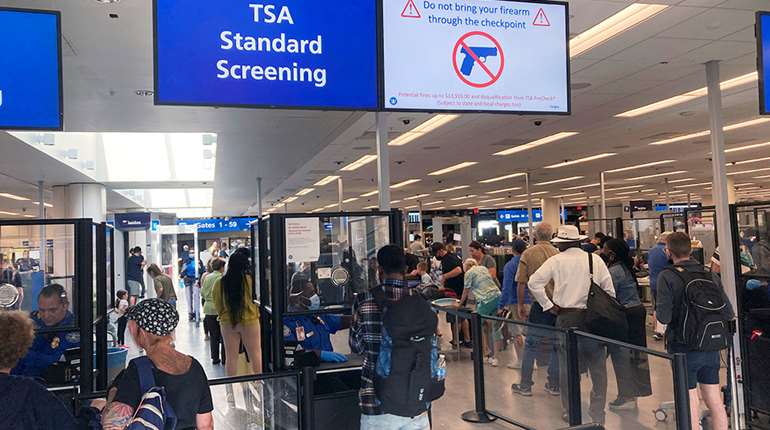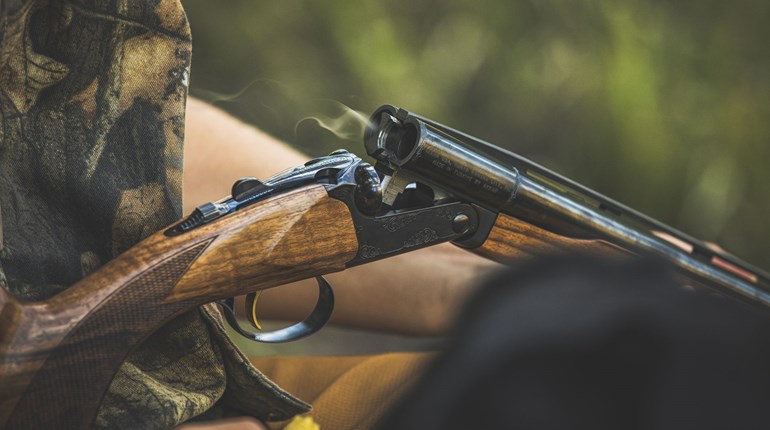
After Al Gore lost the presidential election of 2000—and even lost his own state, Tennessee—the Democrats saw fit to adopt a softer tone on guns for a while. Today, that tone is drying and hardening into concrete. Among the ideas proposed in the last three months by various Democratic contenders are that the most popular rifle in America be banned and confiscated; that all gun owners be registered in a database in Washington, D.C.; that standard-capacity magazines be prohibited; and that the president give Congress a timetable to “act” or face unilateral (read: unconstitutional) alterations to the law. So far and so fast has the party begun to move that even HBO’s Bill Maher warned the party not “to die on this hill.” When you’ve lost HBO ... .
The Democrats’ shift is built atop a persistent unwillingness to accept that American attitudes toward the right to keep and bear arms have changed dramatically since the 1980s—and in a way that does not help them in the slightest. In 1988, the Democrats chose as their presidential nominee Michael Dukakis, a man who had called for a national ban on the private ownership of firearms, who had proposed that the federal government be permitted to prohibit any weapons it considered unsuitable for public use, who had argued for a ban on all semi-automatic firearms in Massachusetts, and who said, openly, “I do not believe in people owning guns, only police and military.” On election day, he was crushed. Today’s voting public is significantly more protective of the Second Amendment than was the one that rejected Dukakis.
During the presidential election of 1988, 42 percent of Americans supported a “law that would ban the possession of handguns, except by the police and other authorized persons,” while 50 percent were opposed. By 2018, support for a handgun ban had dropped to 28 percent, while opposition had risen to 71 percent. In 1993, the year in which Congress considered a raft of gun-control legislation, 42 percent of Americans believed that “having a gun in the house makes it a safer place to be” and 77 percent favored a ban on so-called “assault weapons.” By 2014, some 63 percent believed having a gun in the house made it a safer place to be; by 2018, just 40 percent of Americans supported such a restriction. This is not your father’s gun-control debate.
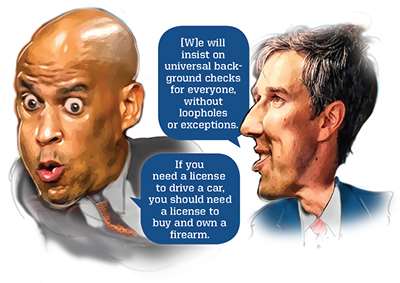
These shifts have been reflected in both the law and the culture. The 1994 “Assault Weapons Ban” expired automatically in 2004 and has not been renewed. Indeed, the Democrats’ one attempt at renewal ended in abject failure, with just 40 members of the Senate signing on. A similar story follows the rise of concealed carry, which has experienced over the last 30 years what can only be fairly described as a renaissance. In 1986, just eight states out of 50 offered “shall-issue” concealed carry, and just one offered permitless (or constitutional) carry. By 2019, those numbers had increased dramatically, to 28 “shall-issue” states and 16 permitless-carry states. Today, Americans can carry a firearm without a permit in about one half of the American landmass. In the meantime, the number of guns in private hands has exploded—today, by some estimates it numbers almost half a billion—at exactly the same time as gun violence has dropped dramatically.
Most important of all, perhaps, is how this has all happened. It is, of course, extremely good news that the Supreme Court recognizes that the Second Amendment protects an individual right. Between 2008 and 2010, in the space of just two years, the Court went from never having directly addressed the question of “the right of the people to keep and bear arms” to having affirmed that—very obviously—it does mean what it says. The Court then, in McDonald, ruled that the right applies against the states as well as against the federal government. And yet it is worth noting that the terrific progress Americans have made in restoring their Second Amendment has been made almost entirely in the country’s legislatures, rather than in the country’s courts. Historians interested in the question of how the right to keep and bear arms was revived in the United States need look no further than the first three words of the Constitution itself: We the People. Opinions changed, and legislators followed.
If the Democratic party understands this, it has a peculiar way of showing it. Indeed, a neutral observer might be forgiven for wondering if its leading lights are trying to will an alternate reality into being by repetition alone. In one sense, the party’s present extremism on guns serves as a neat illustration of an ideological weakness that reared its head during the Obama administration and has become decidedly more pronounced since: Namely, the belief that history has “sides,” and that it is on the “right” one. Such a conviction no doubt makes its progenitors feel virtuous and warm, but, as an electoral proposition, it is shaky at best—especially given just how comprehensively the Second Amendment has been shored up in recent years. As the last 20 years of American politics have shown, simply insisting that “the people” secretly covet more gun control does not work, if it ever did. Nor, for that matter, does attempting to cast gun owners or advocates of the right to keep and bear arms as extremists, idiots or downright bad people. Not everyone is a gun owner in the United States, but most people know somebody who owns a gun—their father or sister or brother-in-law, perhaps—and they know from personal experience that their opposition to being registered or to having their property removed by force is in no way the product of an indifference toward the lives of children.
For evidence of the perils that flow from proceeding as if reality were optional, look no further than Bill Clinton, whose administration indulged a gun-control push in 1993 and 1994 that, among other things, led to the Republican takeover that effectively killed his domestic agenda. In 2013, Clinton addressed a private meeting of the Obama National Finance Committee and warned attendees not to ignore how potent an issue the right to keep and bear arms could be. His failure to take gun owners seriously, he explained, had “devastated” the Democrats’ House majority in 1994—including leading to the Speaker of the House losing his seat—and caused him “many sleepless nights in the many years since.”
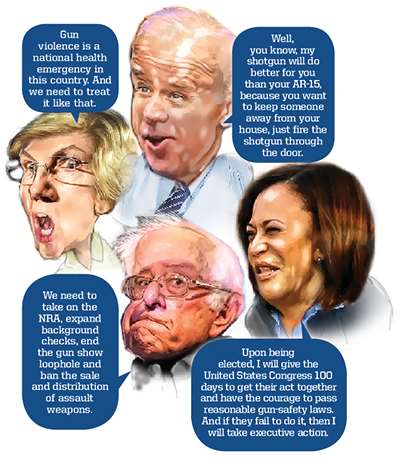
Which is true, of course, but which is not the whole story, for it was not just gun owners turning out en masse that “devastated” Clinton’s presidency; it was the effect the draconian legislation had on moderates and swing voters. In 2018, the Democratic party ran a campaign surgically aimed at the 50-50 “marginal” districts. Among other things, this campaign required candidates in winnable seats to play down the gun-control question, and, in some parts of the country, even to embrace the Second Amendment. Where contenders refused to do so, most notably in Florida, they lost. Where they agreed, they won. Broadly, speaking, the plan worked.
Why the Democrats believe the upcoming presidential election will be different is unclear. What, one wonders, does Eric Swalwell think will be the consequences in Florida and in Ohio of his promise to confiscate 15 million firearms—door to door if necessary? How does Kamala Harris imagine that her promise to take the law into her own hands will be received in Pennsylvania? Does Cory Booker imagine the way to win back blue-collar voters is to demand that every gun owner apply for a federal license and consent to have his name and firearms added to a national database? Does Joe Biden think that ignorant rambling about banning every gun that lacks “the capacity now in a James Bond-style to make sure no one can pull a trigger unless their DNA and fingerprint is on it” will impress a public that knows full well there is no such thing as a DNA-enabled “smart gun”? What do Bernie Sanders and Kirsten Gillibrand think voters will make of their volte-faces on the topic?
And do they really expect this rush to satisfy the people they are hoping to please? If so, they are going to have their work cut out for them. Just a few days after the Democratic debate, Vox’s German Lopez argued that, despite its rapid descent into the gun-control mire, the Democratic party actually remains insufficiently radical. “There should,” Lopez wrote, “be a Medicare-for-all or Green New Deal for ending gun violence.” That’s one of way of putting it, certainly. Another would be “a Manhattan Project for ensuring that Democrats lose the next presidential election.”
So, sure, Bill Maher is correct when he warns the Democrats against dying on this hill. But he is also destined to be ignored, at least for now, as the incentives are lining up in the other direction. Primaries are about appealing to the base, not to the country at large, and the sheer size of the Democratic field is going to force a lot of its candidates into some pretty radical positions. The conventional wisdom holds that, once the election starts in earnest, those positions are quickly jettisoned. But the conventional wisdom may be outdated. Last time around, analysts were sure Hillary Clinton would tack to the center on guns, and perhaps even revive her “Annie Oakley” impression from the late stages of the 2008 primary. But, when it came to it, Clinton did no such thing, declining even to back away from her farcical insistence that “the Supreme Court is wrong on the Second Amendment” in favor of pretending that the Heller decision was about the government’s power “to protect toddlers from guns.” That election was won by 77,744 votes in Michigan, Wisconsin and Pennsylvania. Who wants to bet against guns having been one of the deciding factors?
And, at this rate, who wants to bet against it happening the same way next time?












